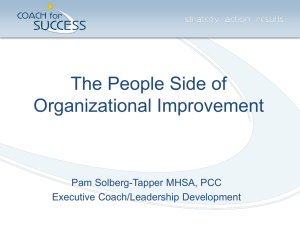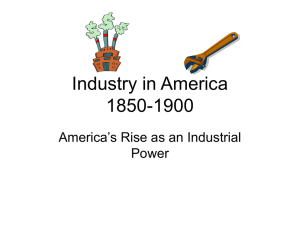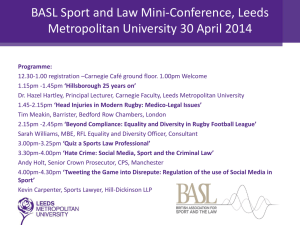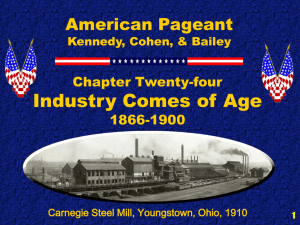Scotland
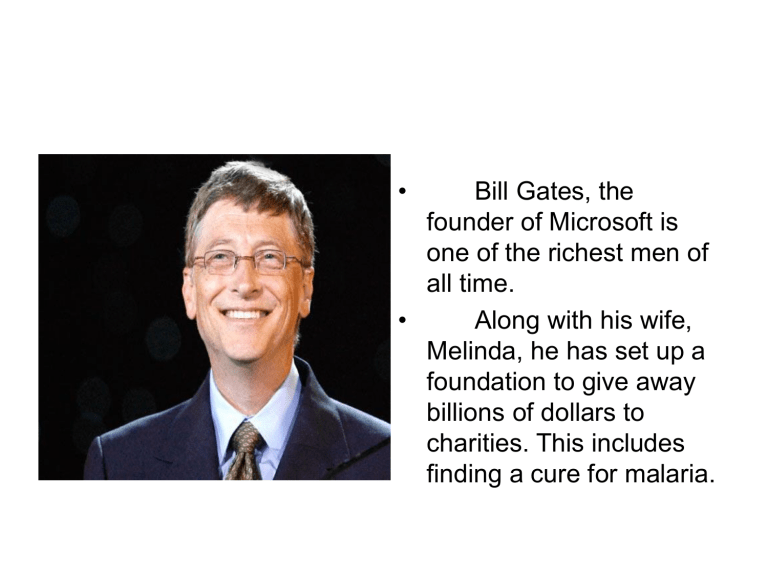
•
•
Bill Gates, the founder of Microsoft is one of the richest men of all time.
Along with his wife,
Melinda, he has set up a foundation to give away billions of dollars to charities. This includes finding a cure for malaria.
Bill Gates is following the example of Andrew
Carnegie in the
19th century
Andrew Carnegie (right) and his younger brother (left)
Scots born Andrew
Carnegie is thought to be the second richest man who has ever lived. Only John D
Rockefeller was richer.
Andrew Carnegie became the world’s richest man in the 19 th century! He was the Bill Gates of his time in more ways than one.
Andrew Carnegie (1835-1919) was born in Scotland.
It is still possible to visit the family home in
Dunfermline.
His family lived in poverty. When there was any work they were weavers.
His father decided to move his family to the USA in
1848.
• Carnegie’s first job in
America was as a
‘bobbin boy’. He changed the bobbins on textile machines.
• He was 13 years old.
• He earned $2 per week and worked 12 hours a day and six days per week.
• Andrew Carnegie’s second job at 18 was delivering telegraphs.
• He earned $2.50 per week.
• But he was learning about how businesses operate.
• Carnegie worked his way up in different companies gaining more and more experience.
• He saved money and invested it in railway stocks and shares which did well.
• Carnegie was on his way.
The American Civil
War meant huge profits for steel companies. This helped Andrew
Carnegie build up his wealth
• Andrew Carnegie started up and expanded the
Carnegie steel company.This eventually became US steel.
• It was the most profitable company in the world
• Andrew Carnegie sold his company in 1901 and spent the rest of his life giving his fortune away.
• He died in 1919
His legacy to the world!
Carnegie was a very charitable man and during his life he gave money away:
• Carnegie set up a trust fund "for the improvement of mankind."
•
This included the building of 3,000 public libraries worldwide (380 in
Britain),
•
The Carnegie Institute of Technology
•
The Carnegie Institution of Washington for research into the natural and physical sciences.
•
Established the Endowment for
International Peace in an effort to prevent future wars.
By the time Andrew Carnegie died in August, 1919, he had given away
$350 million (this is equivalent to $4.3 billion in today’s money.)
Andrew Carnegie’s “Law” for life
• Spend the first third of your life getting all the education you can
• Spend the next one third making all the money you can
• Spend the last third giving it all away to worthwhile causes
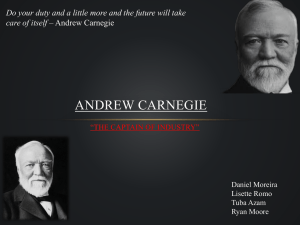
![men_who_built_america[1]](http://s2.studylib.net/store/data/005219845_1-7979604da89ac700f7913bb56611cc41-300x300.png)




